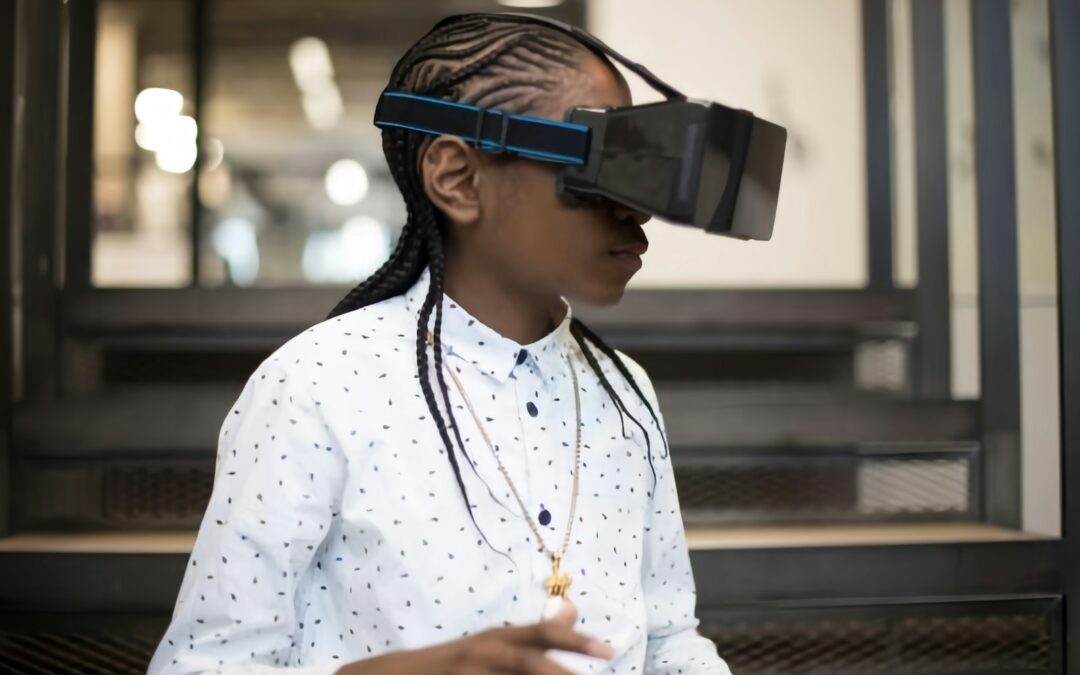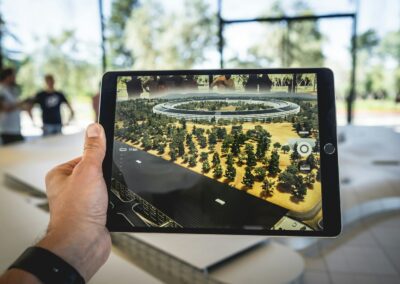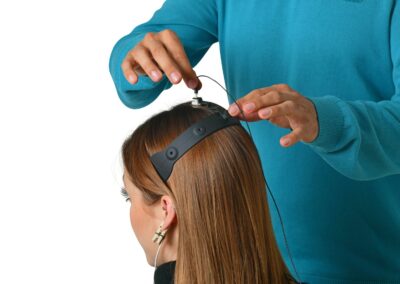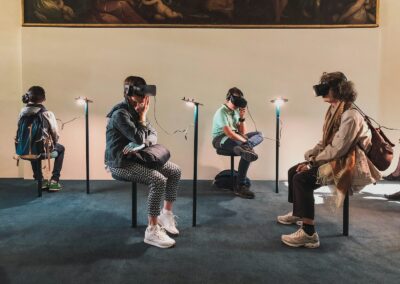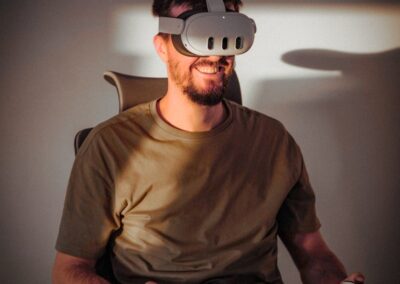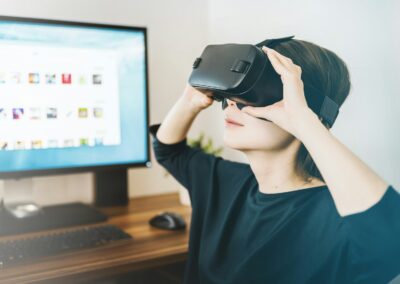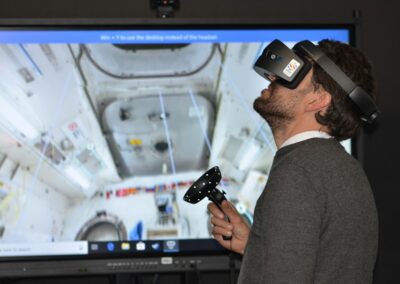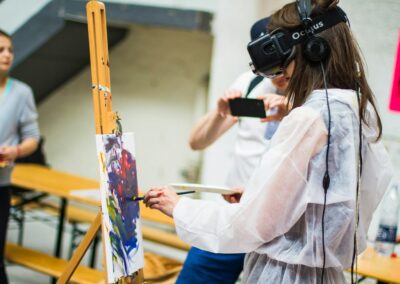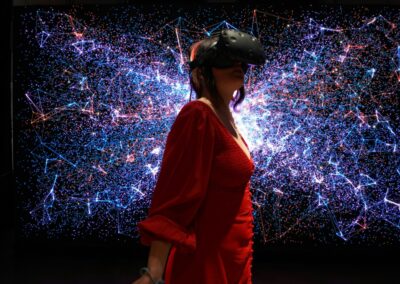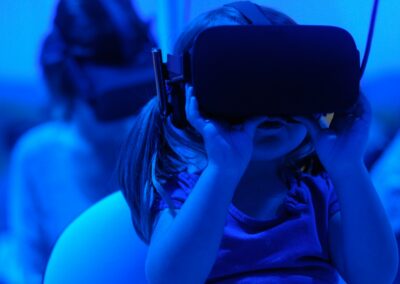Enhancing Metaverse Experiences with VR and AR Headsets
Revolutionizing User Interaction
Virtual reality (VR) and augmented reality (AR) headsets are pivotal in immersing users in the metaverse, allowing them to interact with 3D worlds as if they were physically present. The metaverse represents a collective virtual shared space, integrating virtually enhanced physical reality and physically persistent virtual reality, where users can interact, socialize, and engage in various activities. In regions like Saudi Arabia and UAE, where technological advancements are rapidly embraced, VR and AR headsets are becoming essential tools for experiencing the metaverse.
VR headsets provide a fully immersive experience, blocking out the physical world and replacing it with a virtual environment. This technology is instrumental in gaming, virtual meetings, and virtual tours, where users can explore and interact with digital spaces seamlessly. For instance, companies in Dubai are leveraging VR for virtual real estate tours, allowing potential buyers to experience properties remotely. The ability to “walk through” a property as if they were there offers a significant advantage, enhancing customer experience and accelerating decision-making processes.
AR headsets, on the other hand, overlay digital information onto the real world, enhancing the user’s perception of reality. This technology is particularly beneficial in industries such as healthcare and education. In Riyadh, AR is being used for medical training, where students can interact with 3D models of the human body, providing a hands-on learning experience that is both engaging and informative. The integration of AR in educational settings allows for interactive learning, making complex subjects more accessible and easier to understand.
Business Applications and Innovations
The business potential of VR and AR headsets extends beyond entertainment and education. These technologies are driving innovation in various sectors, including retail, real estate, and tourism. In Saudi Arabia, for example, retailers are adopting AR to enhance customer shopping experiences. AR headsets enable customers to visualize products in their own space before making a purchase, reducing the uncertainty and increasing customer satisfaction. This technology also supports personalized marketing, where customers can receive customized product recommendations based on their preferences and behaviors.
In the realm of real estate, VR headsets are revolutionizing property viewings. Real estate companies in Dubai are offering virtual tours of properties, allowing clients to explore multiple listings from the comfort of their homes. This not only saves time but also broadens the market reach, attracting international buyers who might not be able to visit properties in person. The use of VR in real estate is transforming the buying process, making it more efficient and interactive.
Tourism is another sector benefiting from VR and AR innovations. AR headsets provide tourists with enriched experiences by overlaying historical and cultural information onto physical landmarks. In Riyadh, for example, tourists can use AR headsets to view historical sites with added context, enhancing their understanding and appreciation of the cultural heritage. VR, on the other hand, offers virtual travel experiences, allowing users to explore destinations worldwide without leaving their homes. This is particularly relevant during times when travel might be restricted, keeping the tourism industry engaged with potential travelers.
Future Trends and Developments
The future of VR and AR headsets in the metaverse looks promising, with continuous advancements expected to enhance their capabilities and applications. As technology evolves, these headsets are becoming more accessible and affordable, broadening their adoption across various sectors. In the UAE, government initiatives are supporting the development of VR and AR technologies, recognizing their potential to drive economic growth and innovation.
Artificial Intelligence (AI) is playing a crucial role in advancing VR and AR technologies. AI algorithms are enhancing the realism and interactivity of virtual environments, providing more personalized and engaging experiences. For instance, generative AI can create dynamic content within the metaverse, tailoring experiences to individual users’ preferences and behaviors. This level of customization is essential for businesses looking to offer unique and memorable experiences to their customers.
Blockchain technology is also contributing to the development of secure and decentralized metaverse environments. In Dubai, blockchain is being integrated into VR platforms to ensure the authenticity and ownership of digital assets. This is particularly important in virtual economies, where users can buy, sell, and trade virtual goods. Blockchain provides a transparent and tamper-proof record of transactions, enhancing trust and security within the metaverse.
Executive Coaching and Leadership Development in the Metaverse
Transforming Leadership Training
Executive coaching services are being transformed by the immersive capabilities of VR and AR headsets. These technologies offer a new dimension to leadership training, providing realistic simulations and interactive experiences that enhance learning outcomes. In regions like Saudi Arabia and UAE, where leadership development is a priority, VR and AR are being integrated into executive coaching programs to develop effective leaders capable of navigating complex business environments.
VR headsets enable executives to participate in simulated business scenarios, allowing them to practice decision-making and problem-solving in a risk-free environment. These simulations can mimic real-world challenges, providing valuable insights into leadership styles and strategies. For instance, an executive in Riyadh can use VR to simulate a crisis management situation, practicing their response and refining their skills without the consequences of real-world mistakes.
AR headsets, on the other hand, enhance on-the-job training by overlaying instructional content onto the physical workspace. This is particularly beneficial in industries like manufacturing and logistics, where hands-on training is crucial. In Dubai, AR is being used to guide workers through complex tasks, providing real-time instructions and reducing the learning curve. This approach not only improves efficiency but also ensures that employees are well-prepared to handle their responsibilities.
Enhancing Collaboration and Communication
The collaborative potential of VR and AR is also being leveraged to enhance communication and teamwork within organizations. These technologies enable remote teams to work together in virtual spaces, fostering a sense of presence and engagement that is often lacking in traditional video conferencing. In the UAE, companies are using VR to create virtual meeting rooms, where employees can collaborate on projects as if they were in the same physical location.
AR headsets facilitate real-time information sharing and collaboration. For example, an engineering team in Riyadh can use AR to overlay blueprints and technical data onto physical equipment, enabling more effective troubleshooting and problem-solving. This real-time access to information enhances decision-making and streamlines workflows, leading to increased productivity and innovation.
Building a Competitive Edge
Integrating VR and AR into executive coaching and leadership development programs provides a competitive edge for organizations. These technologies offer a unique way to develop critical skills, such as strategic thinking, communication, and emotional intelligence. By providing immersive and interactive learning experiences, VR and AR help leaders develop the competencies needed to drive business success in a rapidly changing environment.
In regions like Saudi Arabia and Dubai, where the business landscape is highly competitive, leveraging VR and AR for leadership development can set organizations apart. These technologies not only enhance the effectiveness of training programs but also demonstrate a commitment to innovation and continuous improvement. By investing in advanced training tools, companies can attract and retain top talent, ensuring long-term success and sustainability.
Conclusion
Virtual reality (VR) and augmented reality (AR) headsets are revolutionizing the way users interact with the metaverse, offering immersive experiences that enhance various aspects of business and personal life. From enhancing customer experiences in retail and real estate to transforming executive coaching and leadership development, VR and AR are driving innovation and efficiency across multiple sectors. In regions like Saudi Arabia, UAE, Riyadh, and Dubai, the adoption of these technologies is accelerating, supported by government initiatives and a strong focus on technological advancement.
As VR and AR technologies continue to evolve, their potential applications will expand, offering new opportunities for businesses to enhance their operations and competitive edge. By staying at the forefront of these advancements, organizations can ensure they are well-equipped to navigate the complexities of the modern business environment and drive sustainable success.
#VirtualReality #AugmentedReality #Metaverse #VRHeadsets #ARHeadsets #SaudiArabia #UAE #Riyadh #Dubai #ArtificialIntelligence #Blockchain #ExecutiveCoaching #GenerativeAI #ModernTechnology #BusinessSuccess #LeadershipSkills #ManagementSkills #ProjectManagement

